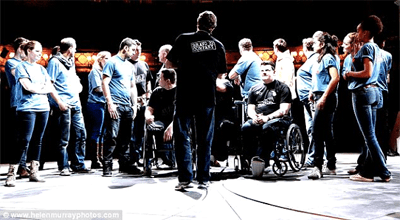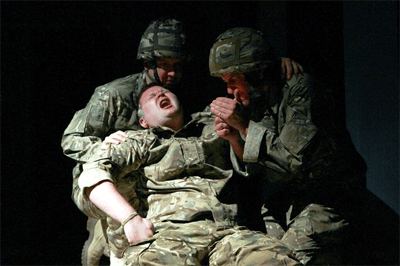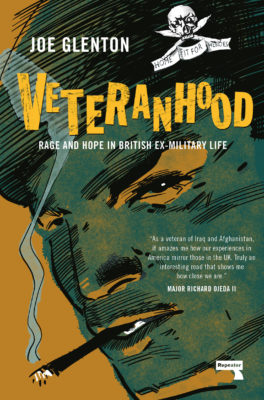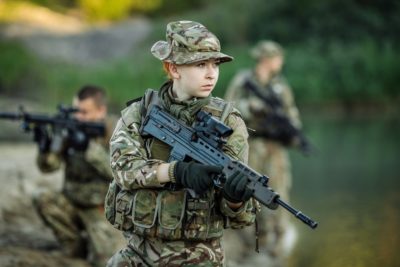The suffering of veterans
Owen Everett, ForcesWatch
A play about and starring injured veterans, and recent government data and policies, highlights their suffering.

A play about and starring injured veterans, and recent government data and policies, highlights their suffering.
A DVD of the first performance of The Two Worlds of Charlie F, a remarkable play about the experience of UK military personnel injured (mostly) in Afghanistan (mentioned here), was released recently. It stars the veterans whose stories that the script, written by Owen Shears, was based on. Directed by Stephen Rayne, the company – Bravo 22 – first performed The Two Worlds of Charlie F at the Theatre Royal Haymarket in January 2012. It then went on tour, showing in Birmingham, Cardiff, and Edinburgh (where it won Amnesty International Freedom of Expression award), before returning to London to finish in September. The play was initiated by the Haymarket’s charity Masterclass, and received funding from The British Legion. Visiting Personnel Recovery Units and rehabilitation centres, Shears and Rayne learnt that 22% of UK combatants in Afghanistan have been injured. The majority of the cast are injured veterans, and all but one were still serving as of January 2012. None of them had ever acted before, although the protagonist, ‘Charlie’, a Canadian Royal Marine, had studied dance at university in the US. They are mostly men. One of the few women in the play is from Trinidad and Tobago and joined the Army after seeing the Queen in a parade. An episode of the BBC arts programme Imagine charted the rehearsal process. In a cigarette break, having been playing a variety of drama games, some of the men joke that it was like being in the Army – they just did what they were told. The joke was extended when one claimed that’s why they were injured. But there’s an element of truth to it. The play is a mixture of monologues, musical and movement numbers, and group scenes, with some light-hearted moments to offer a respite from what is a very sad issue. We learn that one of them ‘joined for a bet’, another – a former bricklayer ‘wanted to be part of it’ after the September 11 attacks on the Twin Towers, and others had family histories of military service. Their loved ones – all portrayed as women – although proud, are very worried about their deployment. The main thing that I took from watching the performance was the huge impact the physical and mental injuries of war have on the individuals’ lives. In one scene the troops attend a frank lesson on injuries they might get – that the whole thing is essentially about bodies: ‘they try and take ours apart, and we try and take theirs apart’. But were these risks communicated to them before they signed up? They recount their injuries one by one – from a double leg amputation to brain damage. Nearly all of them are on medication to ease the great physical pain.  A double-amputee re-enacts his injury. The song ‘Worse At Night’ conveys their mental injuries: one couldn’t sleep for two years because of the horrible scenes witnessed, two took to drinking heavily and one lost his wife as a result of this and the associated depression. Indeed, the impact on their families is quite prominent: one thrashes and sweats heavily in the night, and Charlie struggles to be intimate because he feels so distant. Reports on UK Armed Forces injuries in Iraq and Afghanistan, and on the mental health of personnel, are available on the Defence Analytical Services and Advice website. The most recent quarterly mental health report states that ‘During the three-month period April – June 2012, 954 new episodes of care for mental disorder were identified’ (0.5% of total ‘strength’). Rates were significantly higher in the Army and RAF than the Navy and Marines, significantly higher for women than for men, and significantly lower for officers. A recent parliamentary question revealed the provisional figures for the number of armed forces personnel who were diagnosed with PTSD after attending a military Department for Community Mental Health in the UK has increased from 77 in 2009, to 142 in 2011. It should also be noted that PTSD can take many years to manifest. A month earlier, MP Mark Francois – Minister for Defence Personnel, Welfare and Veterans – disclosed that ‘between 1 April 2010 and 31 March 2011, 142 persons were assessed by the Field Mental Health Team in Afghanistan as having a form of mental disorder. The government is certainly concerned, and it has ring-fenced £7.2 million over the remainder of the spending review period to implement Dr Andrew Murrison MP’s Fighting Fit: a mental health plan for servicemen and veterans. This documents states that, “Service in HM Forces is generally associated with good mental and physical health. However, cases like that of Corporal Johnson Beharry VC have drawn attention to Post Traumatic Stress Disorder (PTSD) and, more generally, to service-related mental disorder including mild traumatic brain injury (mTBI)1. The linked issue of alcohol abuse is significantly associated with service in the Armed Forces and there is evidence that it is more common among combat veterans2. Mental illness is a root cause of both homelessness and involvement in the criminal justice system. It is probable that veterans are either over-represented or more likely to have mental health problems in the two groups.” (links have been added to this quote) A range of services has been implemented as a result to try and stem what is an inherent problem with warfare. For more on the risks associated with serving in the armed forces and links to current research see here.
A double-amputee re-enacts his injury. The song ‘Worse At Night’ conveys their mental injuries: one couldn’t sleep for two years because of the horrible scenes witnessed, two took to drinking heavily and one lost his wife as a result of this and the associated depression. Indeed, the impact on their families is quite prominent: one thrashes and sweats heavily in the night, and Charlie struggles to be intimate because he feels so distant. Reports on UK Armed Forces injuries in Iraq and Afghanistan, and on the mental health of personnel, are available on the Defence Analytical Services and Advice website. The most recent quarterly mental health report states that ‘During the three-month period April – June 2012, 954 new episodes of care for mental disorder were identified’ (0.5% of total ‘strength’). Rates were significantly higher in the Army and RAF than the Navy and Marines, significantly higher for women than for men, and significantly lower for officers. A recent parliamentary question revealed the provisional figures for the number of armed forces personnel who were diagnosed with PTSD after attending a military Department for Community Mental Health in the UK has increased from 77 in 2009, to 142 in 2011. It should also be noted that PTSD can take many years to manifest. A month earlier, MP Mark Francois – Minister for Defence Personnel, Welfare and Veterans – disclosed that ‘between 1 April 2010 and 31 March 2011, 142 persons were assessed by the Field Mental Health Team in Afghanistan as having a form of mental disorder. The government is certainly concerned, and it has ring-fenced £7.2 million over the remainder of the spending review period to implement Dr Andrew Murrison MP’s Fighting Fit: a mental health plan for servicemen and veterans. This documents states that, “Service in HM Forces is generally associated with good mental and physical health. However, cases like that of Corporal Johnson Beharry VC have drawn attention to Post Traumatic Stress Disorder (PTSD) and, more generally, to service-related mental disorder including mild traumatic brain injury (mTBI)1. The linked issue of alcohol abuse is significantly associated with service in the Armed Forces and there is evidence that it is more common among combat veterans2. Mental illness is a root cause of both homelessness and involvement in the criminal justice system. It is probable that veterans are either over-represented or more likely to have mental health problems in the two groups.” (links have been added to this quote) A range of services has been implemented as a result to try and stem what is an inherent problem with warfare. For more on the risks associated with serving in the armed forces and links to current research see here.
See more: risks, veterans,
Like what you read?
> Sign up for our newsletter or blog notifications
> Support our work – from just £2 a month










